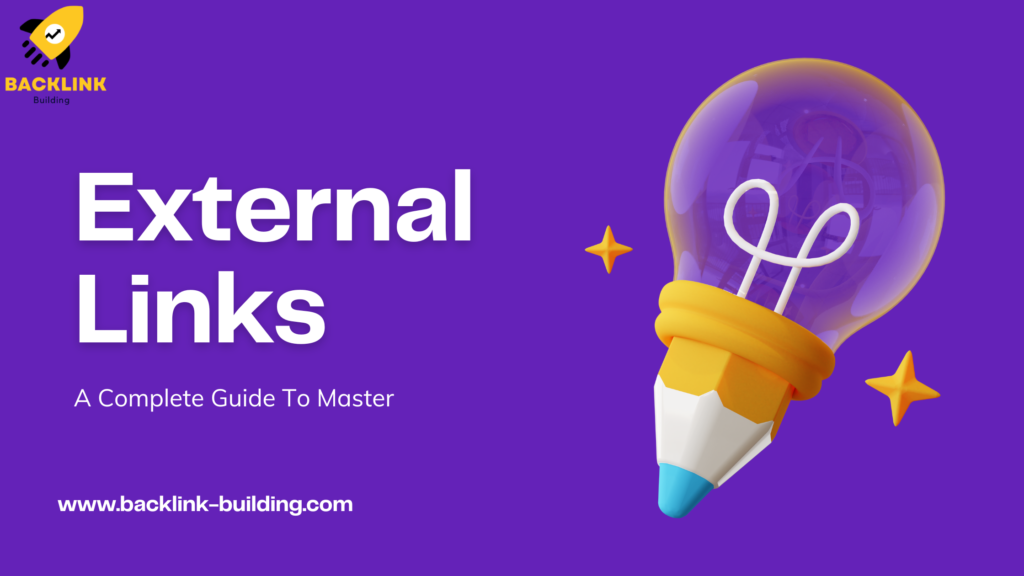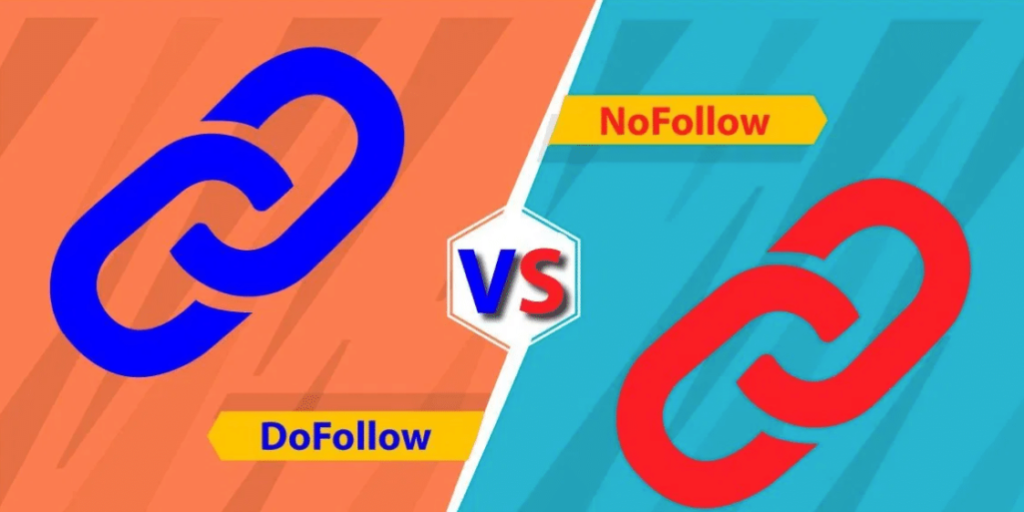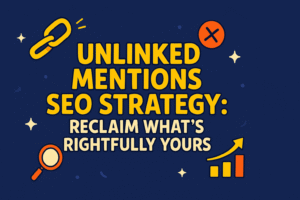
We Always talk about links in SEO, how important they are, and what type of links we need to create for our website, but today, I want to talk about External links, what they are, and what role they play in SEO.
You might have a website linking to another website or blog post. This is what we call an external link. They have hyperlinked that point to a different domain other than your own. So if I have a website about SEO and I am linking to a website about Content Writing, this is what we would call an external link.
So, In this blog, we will discuss everything related to external links, what they are, how they work, and what type of links you should create. You might be thinking.
Let’s get started!
What Is Link In SEO?
In SEO, a link is an HTML element that allows users to move from one web page to another. The linked text is usually underlined and colored, making it easy for users to identify them.
There are two types of links.
- Internal Links
- External Links
Internal links connect the pages within your website, while external links connect your website to other websites. Both external and internal links are essential for a website.
This blog will focus on external website links or what most people call “backlinks.” Let’s get started by understanding what they are and how they work!
What Are External Links?

External links connect your website to another domain. They usually happen when you link to someone else’s website or blog post from your site.
For example, if I have a blog post about SEO and want to link to a website about Content Writing, I would create an external link.
It’s important to note that not all external links are created equal. There are two types of external links:
- Nofollow Links
- Dofollow Links
Difference Between Nofollow And Dofollow External Links

Nofollow links are those that have the rel=”no follow” attribute. This means that Google won’t crawl or index the linked page.
On the other hand, follow links don’t have the rel=”no follow” attribute. This means that Google will crawl and index the linked page.
In general, it’s best to create follow links because they help your SEO. However, there are some cases where you might want to create a no-follow link. We’ll discuss this more in-depth later.
Note
rel=”no follow” attribute?
The rel=”no follow” attribute is an HTML element that tells search engines not to crawl or index the linked page.
Are External Links Good For SEO?
The answer is yes! External links are good for SEO because they help Google understand your website.
When you link to another website, you’re telling Google you trust that site. This helps increase your website’s authority and credibility.
PageRank is a metric used by Google to measure the quality and importance of a web page. The higher your PageRank, the more likely you will rank high in search results. External links also help improve your website’s PageRank
Benefits Of External Links
- It helps Google understand your website.
- It helps increase your website’s authority and credibility
- It helps improve your website’s PageRank
- Allows users to navigate your website easily
- Increases the time spent on your website
- Reduces your bounce rate
- Boosts your SEO efforts
- Drives traffic to other pages on your website
- Creates a better user experience
Drawbacks Of External Links:
- Time-consuming process
- Less control over the anchor text.
- Risk of linking to a low-quality or spammy website.
- The link may get lost on the page.
- The linked website could go down or change its URL.
- You could link to a page that’s already been penalized by Google.
- The linked website could be in a different language.
- Linking to too many external sites could hurt your SEO.
Factors Determining Quality Of External Links:
There are a few factors that determine the quality of an external link. Here are some of the most important ones:
The PageRank Of The Linking Site
The higher the PageRank of the linking site, the better. A high PageRank indicates that the site is popular and trustworthy.
The Relevance Of The Linking Site
The more relevant the linking site is to your own, the better. For example, if you have a website about SEO, it would be beneficial to get links from digital marketing or web design websites.
The Authority Of The Linking Site
The more authoritative the linking site is, the better. An authoritative site is one that many people trust.
The Content Of The Linked Page
The linked page’s content should be relevant and valuable to your readers.
The Anchor Text Of The Link
The anchor text is the text that appears on a web page that links to another web page. It’s essential to use relevant and descriptive anchor text so users know what they’re clicking on.
Ways To Get External Links
There are many ways to get external links. Here are 10 of the most effective:
Reach Out To Influencers And Ask For Links
If you know of any influencers in your industry, contact them and ask for a link. This is especially effective if you have something newsworthy to share, such as a new product launch or an upcoming event.
In this scenario, it’s both win-win: you help influencers by providing them with relevant content to their audience, and in turn, they allow you to link to your website.
Submit Your Website To Directories
There are many online directories where you can submit your website. The most popular ones include DMOZ, Yahoo! Directory, and Business.com.
When submitting your website, choose a relevant category related to your niche and accurately fill out all the required information. This will help increase your chances of getting approved and driving traffic to your website.
Write Guest Posts On Other Blogs
A guest post is an article you publish on someone else’s blog. It is a time-consuming process, but it pays off with the quality links to the site. When writing a guest post, be sure to include at least one link back to your website.
Create Valuable Infographics And Share Them
People love infographics because they’re easy to consume and contain valuable information. If you create high-quality infographics, people will likely link to them. Because no one wants to share a link to the lengthy blog, Everyone wants things in a clear picture.
To increase your chances of getting links, include an embed code on your infographic so others can easily share it on their website.
Get Mentioned In News Articles And Press Releases
Getting mentioned in the news is one of the most potent ways to get links. If you are doing something newsworthy, such as winning an award or getting featured in the press, include links to your website in the articles. This will help increase your website’s exposure and authority.
Even if you’re not doing anything newsworthy, you can still try to get mentioned in press releases. You can do this by reaching out to companies and offering your products or services as a solution to their problems.
If you’re mentioned in a press release, there’s a good chance that it will be picked up by news sites and other publications, resulting in links to your website.
Participate In Forums And Answer Questions
If you participate in forums related to your niche, you can often include a link to your website in your signature or profile. This is a great way to get links and drive traffic to your website.
When participating in forums, add value and help others with their questions. This will increase your chances of building trust and credibility with potential customers.
Partner With Other Businesses In Your Industry
One of the best ways to get links is to partner with other businesses in your industry. For example, if you sell eco-friendly products, you can partner with an environmental organization and share links to each other’s websites.
Not only will this help you get quality links, but it will also help you build relationships with other businesses in your industry.
These are just a few ways to generate external links. By following the best practices above, you can increase your chances of getting high-quality links that will help improve your SEO.
Is It Possible To Rank Without External Links?
The answer to this question is, unfortunately, no. External links are still an important ranking factor for SEO. While it is possible to rank without external links, it isn’t very confident.
If you want to rank higher in search engine results pages and drive more traffic to your website, focus on building high-quality external links.
Following the tips and best practices outlined in this article, you can build quality external links and improve your website’s SEO.
How To Manage External Links?
Now that you know the importance of external links, it’s time to learn how to manage them. Here are two ways:
- Free Tools
- Paid Tools
Free Tools
Google Search Console
This free tool from Google lets you see the links pointing to your website. This tool can track your link-building progress and identify any potential problems.
Google Analytics
This is another free tool from Google that tracks traffic from external links. You can use this information to see which links drive the most traffic and adjust your link-building strategy accordingly.
Paid Tools
Moz and Ahrefs
These paid tools provide detailed information about your website’s link profile. It also includes tools to help you find new link opportunities and track progress.
There are several paid tools in the market, but Moz and Ahrefs are two of the most popular. Both tools offer a free trial, so you can try them before deciding which one to use.
Conclusion
The above guide provides detailed information on website external links and how to build external links for seo. Following the tips and best practices in this guide can improve your website’s SEO and drive more traffic. Thanks for reading!
If you have any questions about external linking? Leave a comment below, and we’ll answer them!


